
Canaries, the southern frontier of Europe and gateway for thousands of migrants, is facing a silent collapse: that of protection for unaccompanied children.
Without a doubt, this has been one of the points where virtually all groups in the regional Parliament have agreed during the Commission on Social Rights, Equality, Youth and Childhood held on 11 July.
The purpose of the Commission was to present the report by Amnesty International (AI), titled “As of today I have nothing” (made public in March 2025), which starkly outlines the impact of institutional disorganisation on the lives of thousands of minors.
This document focuses on the situation of migrant children arriving in the Islands. In this new investigation, Amnesty International highlights the human rights violations occurring in the reception of children reaching the Canary Islands.
In November 2024, the General Directorate for the Protection of Children and Families of the Canarian Government (hereafter the General Directorate of Childhood) informed Amnesty International that it was responsible for 5,098 boys and 312 girls. However, due to the failures noted in the detection and identification of unaccompanied minors, the number of children arriving in the Canaries “is surely much higher,” stated Virginia Álvarez, spokesperson for AI, during her parliamentary remarks.
Moreover, the investigation reveals a structural problem: the lack of coordination between the regional government, the central government, and the Public Prosecutor’s Office. The consequence: blocked procedures, lost documents, or processes that are never initiated, leaving unaccompanied minors adrift without papers or effective protection.
One of the most alarming examples is provided by Pierre (a fictitious name), a young Cameroonian who arrived at the age of 17 years and two months. Two years later, he still does not have a residence permit. “I am studying cookery, I want to help my mother, but I turn 18 and have nothing. How am I going to survive?” he told Amnesty.
The case of this young man illustrates the bureaucratic drama surrounding regularisation files that become stuck in a chain of unrelated procedures and unequal decisions, depending on which Canary province the individual finds themselves in. The lack of a unified criterion between the prosecutor’s offices of Las Palmas and Santa Cruz de Tenerife, particularly regarding age determination, was a point that was repeatedly highlighted in the interviews conducted by Amnesty.
In some provinces, medical reports allow for an age margin (ranges) that protects the minor by default. In others, such as Santa Cruz, this is rejected, forcing decisions that can exclude minors from the protection system.
As the report notes, institutional representatives themselves recognise the severity of the situation. The General Directorate of Childhood admitted to Amnesty the deficiencies in tracking minors and the impossibility of adequately monitoring the guardian entities. Amnesty’s representatives emphasise that what is at stake is the present and future of human beings in a state of extreme vulnerability.
Furthermore, they warn that this disorganisation is not a temporary anomaly but systemic.
The Immigration Law mandates the granting of residence permits from the moment a minor comes under guardianship. However, the failure to comply with this mandate by the administrations, as Amnesty points out, leaves many in an irregular situation just as they reach adulthood.
A social worker indicated that “in my experience, nearly 50% of minors are left without documentation due to delays in the processes. Fortunately, to obtain documentation for a minor, you need at least a year and a half.”
The report concludes that this disorganisation “creates a bureaucratic tangle that drives minors towards social exclusion when they reach 18,” leaving them feeling abandoned.
An abandonment that is felt, suffers, and fears. As Pierre said, with a trembling voice: “I am afraid this will happen to me too.”















